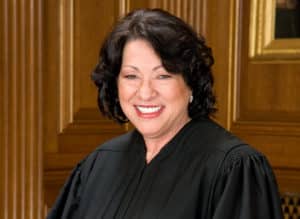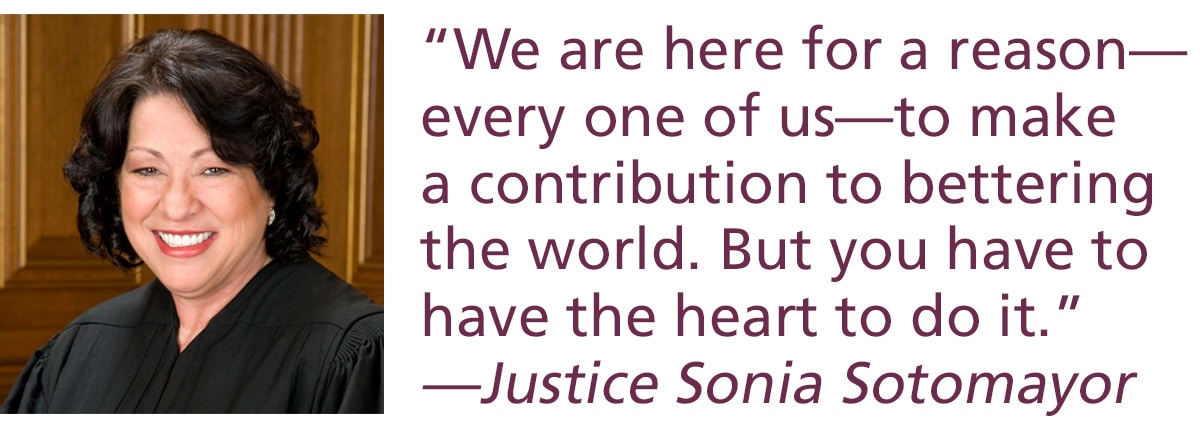Justice Sotomayor Championing iCivics to Cultivate Thoughtful, Active Citizenship
Print This Post
U.S. Supreme Court Associate Justice Sonia Sotomayor
When U.S. Supreme Court Associate Justice Sonia Sotomayor recently visited Emory University School of Law, she reflected on her first day on the job when she received invaluable advice from the second-most senior judge on the Court. Justice Sandra Day O’Connor counseled Sotomayor to be decisive in her decision-making—that no matter how unsure she was, the responsibility of a judge is to decide.
Nine years later, Sotomayor continues to follow that advice in the courtroom, and has begun following O’Connor’s lead in the classroom. She’s championing the online, evidence-based iCivics curriculum O’Connor founded, which is re-imagining civic education to cultivate students across the nation for thoughtful and active citizenship.
Using iCivics, students gain civic knowledge and skills through online tools, hands-on activities, and games that transform abstract concepts into real-life problems, so the learning experience is fun and challenging. Young people learn how government works by stepping into the role of a lawyer, a judge, a member of Congress, a community activist, even the president of the United States.
Here in Georgia, the State Bar’s iCivics Committee is working with Georgia Family Connection Partnership (GaFCP), along with other partners, to expand audiences for iCivics. While Georgia already has the fifth highest usage of iCivics in the nation, the Bar Committee, GaFCP, and others are focusing this year on improving civic knowledge and overall civic health—particularly in rural communities and with populations that data and research tell us are traditionally not as engaged.
“We’re trying to get iCivics to develop lesson plans for how to take what kids are learning in the classroom and to take on local projects to try to improve their communities,” said Sotomayor, who highlighted the linkage between civic engagement and the ability to make a difference for everyone.
“I believe in our involvement,” she said. “I believe with all my heart that unless we become engaged in our country and become active participants in making a difference in the world we’re in, we will be nothing but bystanders otherwise. And nobody should live their life being a bystander. We are here for a reason—every one of us—to make a contribution to bettering the world. But you have to have the heart to do it. And you have to have the energy and desire to leave behind a legacy greater than merely standing on the sidelines. And so, that’s my involvement in iCivics, because it touched the cord in me that the best place to start making good citizens is in grammar school.”

Sotomayor also spoke on the importance of engaging students in our democracy as responsible citizens—now and throughout their lives.
“I’m really good at taking people’s ideas, so I’ve taken Justice Sandra Day O’Connor’s initiative, iCivics, and have now tried to expand it to reach more inner-city school kids who have reading and language difficulties,” said Sotomayor as she meandered the aisles of Emory’s Glenn Memorial Auditorium talking with faculty and students, members of Georgia’s judiciary, and representatives from the Georgia State Bar’s iCivics Committee.
A South Bronx native raised by parents of Puerto-Rican descent, Sotomayor went on to share her own story about how she became a lawyer and what it was like to be an outsider for much of her life—as a freshman at Princeton University, and in her career—to demonstrate her unique influence on the national civics education initiative.
“When Justice O’Connor was stepping back from active participation and they asked me to join the Board—I did on one condition,” she said. “I wanted to ensure that we worked with kids who had English as a second language, and kids who had reading disabilities, and I wanted iCivics to start looking at their needs and incorporating some solutions for those kids into the games.”
So far, iCivics, which began by targeting middle schoolers and is now moving into high schools, has met Sotomayor’s challenge by translating one of the games, “Do I have a Right?” into Spanish. According to Sotomayor, she and the national organization hope to translate all 18 critical thinking games into multiple languages, and to provide supplemental resources for students with reading disorders.
“We know that civic engagement is lower in Georgia than in other parts of the country, and we know that increased civic knowledge leads to higher levels of civic engagement. By helping introduce the free, evidence-based, user-friendly resources provided through iCivics to the parts of our state and to our teachers and students who may not otherwise know about them, we can help Georgia’s students become highly-informed, engaged, and productive citizens,” said Georgia State Bar iCivics Committee Chairwoman Evelyn Davis. “I completely agree with Justice Sotomayor that we all need to be more than bystanders. By spreading the word about iCivics here in Georgia, we’re doing our part to get off the sidelines and help build a new generation who will have the heart and desire to better our state and our nation.”
Watch Supreme Justice Sonia Sotomayor’s entire conversation on Emory University School of Law’s YouTube channel (she talks about iCivics from 52:12 – 58:12):
For questions about iCivics or the State Bar’s iCivics Committee, contact:
Evelyn Davis
Georgia State Bar iCivics Committee
edavis@hptylaw.com
To schedule an iCivics training for teachers, after-school providers, or others in your community, contact:
Elizabeth Turner
Georgia Family Connection Partnership
elizabeth@gafcp.org
To request a volunteer attorney to help teach law-related iCivics lessons to students in your community, contact:
Shiriki Cavitt
Georgia State Bar iCivics Committee
shiriki.cavitt@equifax.com
Contact:
Bill Valladares
GaFCP Communications Director
404-739-0043
william@gafcp.org
Follow us on Twitter: @gafcpnews
